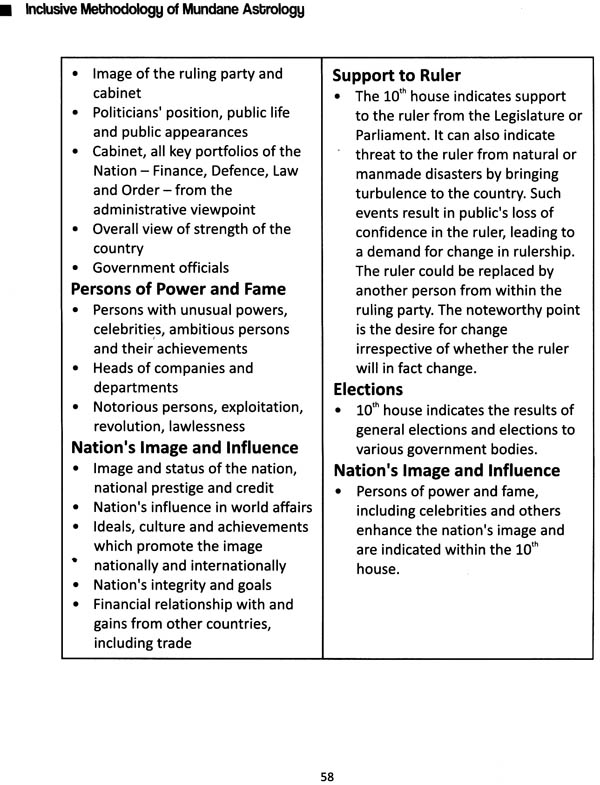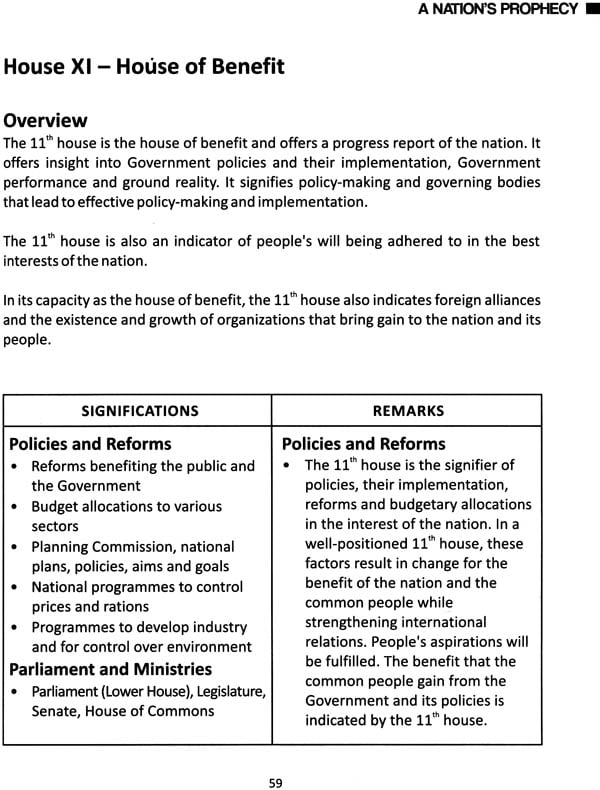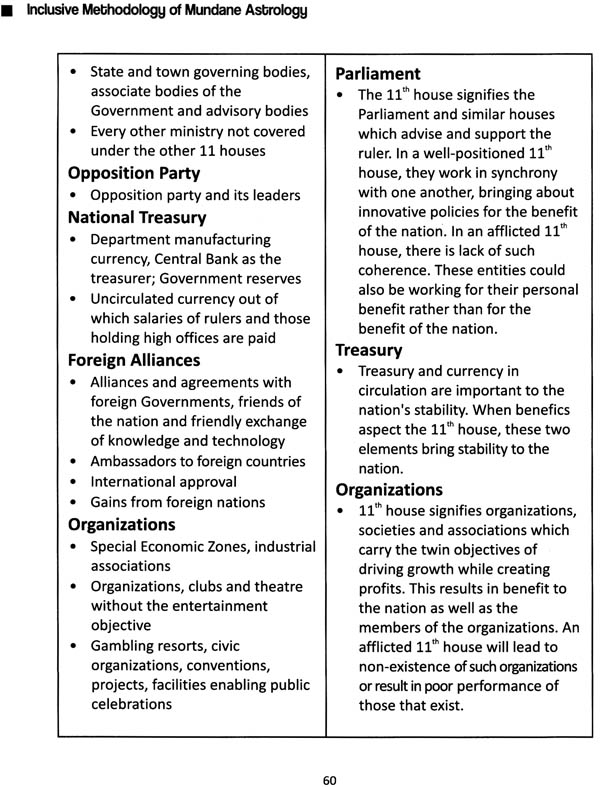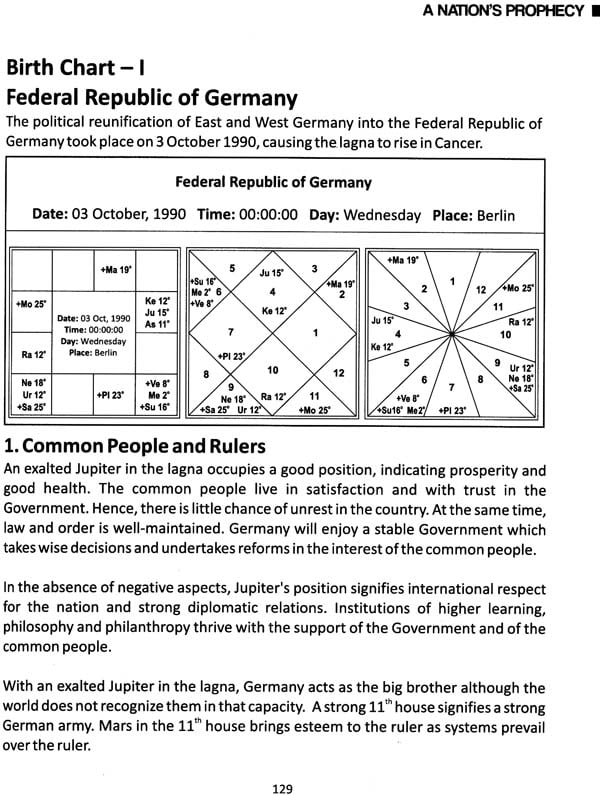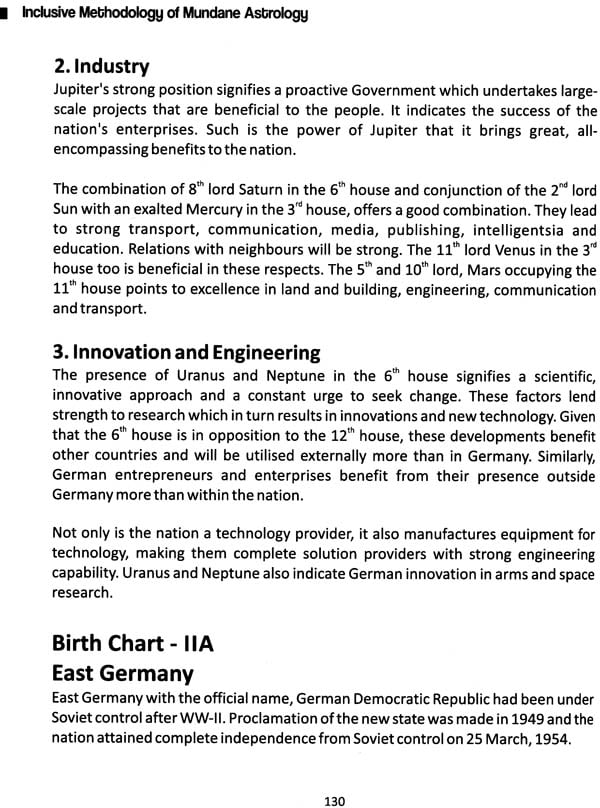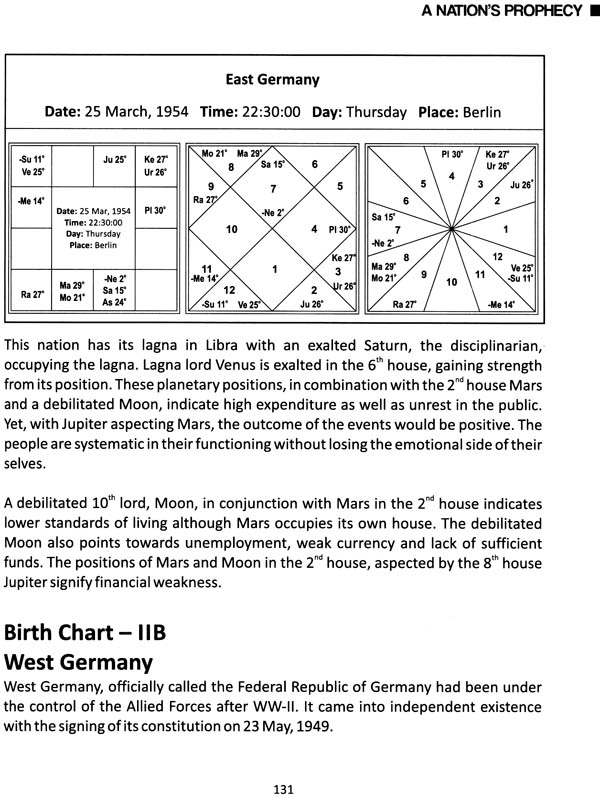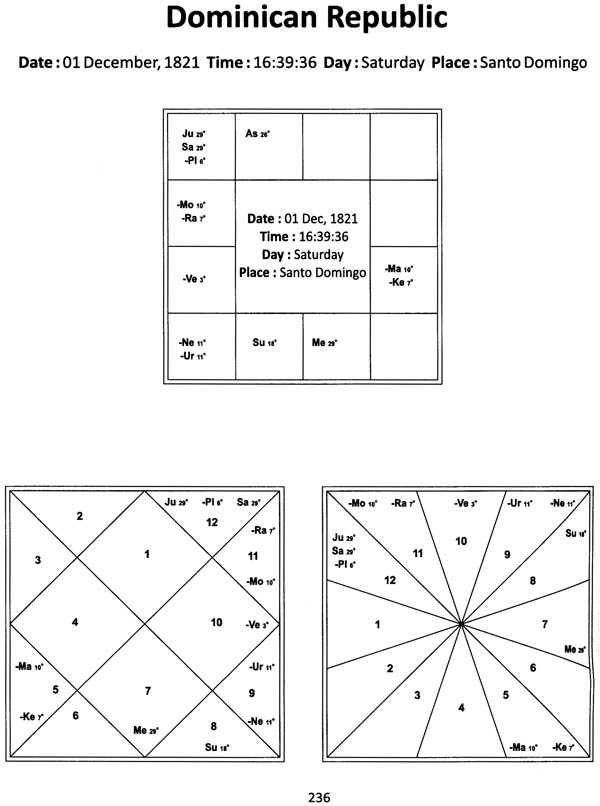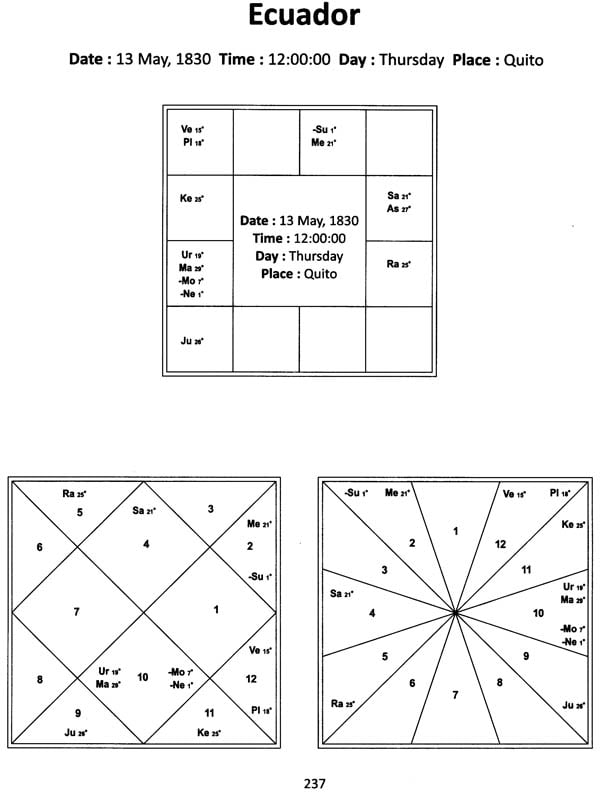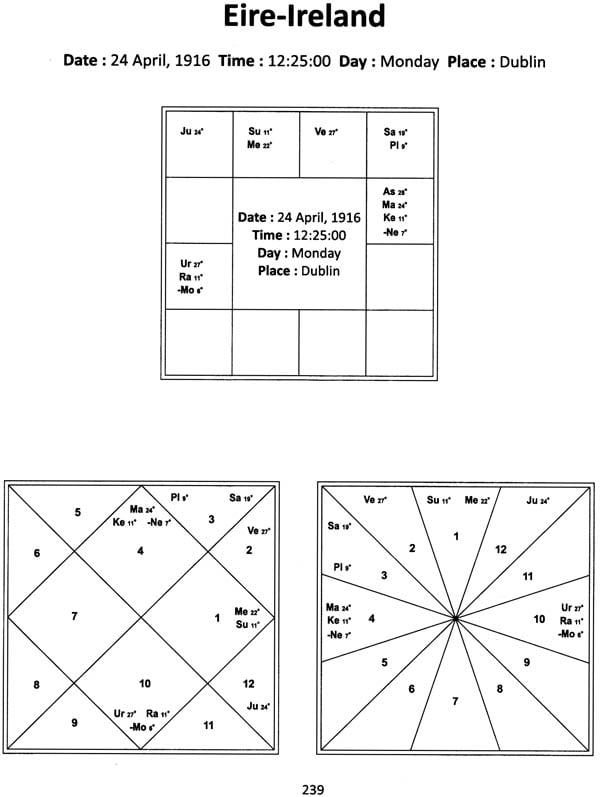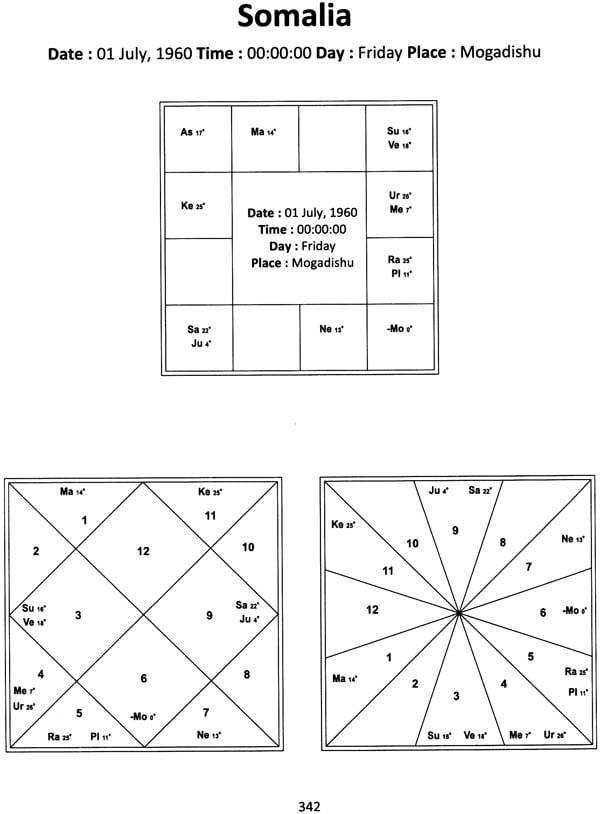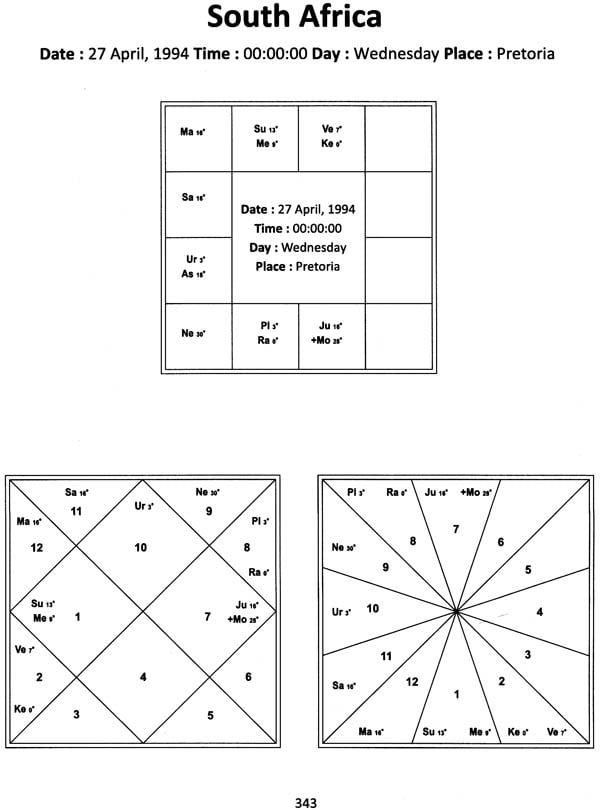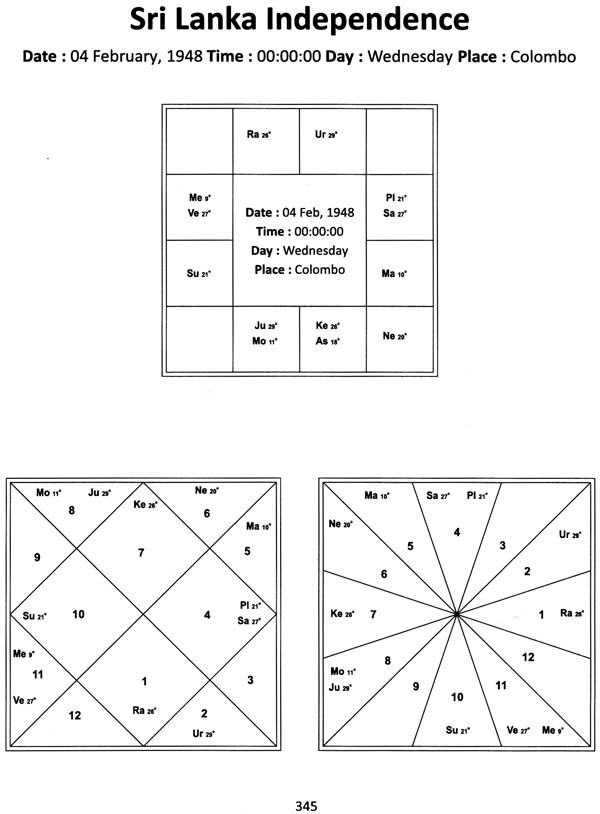
A Nation's Prophecy (Inclusive Methodology of Mundane Astrology by Dr. Ravi Rao)
Book Specification
| Item Code: | NAG144 |
| Author: | Dr. Ravi Rao |
| Publisher: | Star Publication House |
| Language: | English |
| Edition: | 2014 |
| ISBN: | 9788192304960 |
| Pages: | 399 |
| Cover: | Paperback |
| Other Details | 9.5 inch X 7.5 inch |
| Weight | 700 gm |
Book Description
The Inclusive Methodology of Mundane Astrology is a comprehensive guide to predicting mundane events of nations. A necessary reference book.
Predict socio-politico-economic events of nations, end-result of current events and he fate and effectiveness of rulers with accuracy.
Case studies of seven leading nations-China, Germany, India, Russia, United Kingdom and United States of America. Overall prediction of past events based on birth and transit charts, study of a nation’s multiple births and of rulers’ charts.
Categorization of nature and scope of houses and planets for the first time- help in remembering and applying the finer points with ease and comprehensiveness.
Birth charts of all 200+ nations in three formats- South Indian, North Indian and Western. Make your predictions for any country of the world.
An essential book for every astrologer to arrive at comprehensive, accurate predictions and meet requests of eminent personalities seeking the predictions. Bring clarity, comprehensiveness and relevance to mundane astrology for the first time. The inclusive Methodology enables astrologers to see the big picture with multiple elements and charts simultaneously.
“The author, Dr. Ravi Rao, .. makes his literary foray into Jyotisha with this book which, for all practical purposes, can serve as a standard textbook on mundane astrology. One could even describe this book as a benchmark work in mundane astrology.”
Dr.Ravi Rao is an astrologer and vaastu practitioner of international repute with 20+ years of experience. Dr.Rao is known for his accurate predictions in mundane astrology, having predicted the results of elections, among others. Given mundane astrology's ability to predict future events that have widespread impact, Dr.Rao is an active proponent and supporter for the resurgence of mundane astrology.
With an intuitive and problem-solving approach, he has been advising people who seek guidance in personal, professional, corporate and political matters. Some of the companies that Dr.Rao advises belong to the Fortune 500 list. Dr.Rao is widely travelled, with his assignments taking him to Africa, Australia, UK, USA, Canada, UAE and South-East Asia. He has a track record of helping companies achieve turnarounds as well as accelerated growth through his astro-vaastu advice and in creating business logos that bring success.
Dr. Rao currently advises functionaries on state and national matters. He is based in Ahmedabad, Gujarat, India. Dr. Rao can be reached at www.ravirao.com.
Contributors
Madhuri.Y and Wing Commander Arun Kaul (Retd.) have assisted Dr.Ravi Rao in researching and writing the Inclusive Methodology of Mundane Astrology. Madhuri is an alumnus of the Indian Institute of Management-Ahmedabad. She writes children's fiction and is a ghost writer of non-fiction books. For more information, please visit www.ymadhuri.com. Wing Commander Kaul is the author of the book of non-fiction stories, Only One Life to Give. He can be reached at www.arunkaul.com.
The author, Dr. Ravi Rao, known for his Vastu expertise, makes his literary foray into Jyotisha with this book which for all practical purposes can serve as a standard textbook on mundane astrology. One could even describe this book as a benchmark work in mundane astrology.
Jyotisha, also known as astrology in modern times, is a systematized and structured body of knowledge that has come down to us from the great Rishis of ancient India. It is perhaps as old as the Vedas but still in its infancy in terms of explored potential. Jyotisha as wrongly understood is not just about trying to unravel the future of an individual. There is much more to it. All ancient works on Indian astronomy are very clear in stating the content of Jyotisha.
meaning, Jyotisha or astrology comprises of three sections, namely, Siddhanta, Samhita and Hora and is the eye of the Vedas.
Siddhanta is Ganita plus Gola or mathematics and spherical astronomy which deals with computing different kinds of astronomical phenomena such as planetary positions, ingresses, eclipses, the setting and rising of planets, aspects and other data related to celestial bodies.
Samhita is the study of the connections between astronomical phenomena and terrestrial affairs involving large groups of people or huge geographical tracts. The last branch is Hora or the study of astronomical phenomena in relation to individual lives and what in common parlance has come to be known as astrology.
The second branch Samhita which can be translated as mundane astrology is of great consequence as it deals with the fates and fortunes of nations. It covers natural phenomena also such as weather, agriculture, epidemics, natural calamities - earthquakes, floods, tsunamis, drought and famine etc as also political happenings such as wars, treaties, migrations, economic cycles and national and international developments that affect collective destinies.
Both the applicational branches of Samhita and Hora have been part of Indian social life since aeons as is evident from astrological references to them in the epics - the Ramayana and Mahabharata as well as in many of the Puranas or scriptural texts of India.
Unfortunately, for whatever reason, Samhita or mundane astrology slipped into a state of neglect while Hora or the predictive astrology of individuals continued to flourish and became an integral and inalienable part of the social life of our country.
There are very few books on mundane astrology though the subject has been kept alive through the editorials of Dr. B.V. Raman's THE ASTROLOGICAL MAGAZINE (1936 - 2007) and now through its successor MODERN ASTROLOGY. In fact, there are hardly any authoritative books on Samhita in the extant Jyotisha literature. Dr. Ravi Rao's book fills this lacuna remarkably well. He has delved deep into the subject to come out with a book aimed to cater to the needs of the serious student of astrology. The whole subject is dealt with in a rare but bold clarity while pointing out certain departures that he makes from the beaten track. What stands out is the somewhat racy style the author employs in dealing with an ancient system of knowledge.
Dr. Ravi Rao stresses on the need for one to be conversant with current socio- economic-politico conditions before venturing on mundane forecasts. Rightly so, for tremendous changes have taken place since the mundane astrology principles were first enunciated and their adaptation to present times is a difficult exercise and possible only when one has a clear understanding of present day national and international affairs.
The application of mundane astrology principles can be of great help in anticipating election results, wars and violence, aggressive designs, economic trends, social upheavals as also political happenings which could help in being forearmed. Terrorist attacks are a distinct phenomenon of the late 20th century and the present century. None can dispute the advantages of being forewarned of such attacks when hundreds of lives could be saved. However, in understanding and applying the techniques needed for such forecasts, what is extremely important is the horoscope of the country where such strikes can occur.
The post mid-nineties have seen the birth of many independent states with the British Empire breaking up and Russia disintegrating. Other parts of the world too have seen many changes territorially and otherwise. Therefore, there is a great need to have the correct data relating to the birth of such states before one can venture on a forecast on socio-politico-economic happenings. Dr. Ravi Rao has painstakingly worked at procuring such data and making it available to the reader. Except for some nations, most of the charts have been cast for 12 noon in the absence of the correct time at which the states came into existence. This approach may be open to debate. Where the birth-time is not available, the Moon-sign can be depended upon to a certain extent. It is hoped the author will explore this approach too in his next edition.
A systematic approach based on hypothesis, verification and inference characterizes Dr. Ravi Rao's efforts in this direction which involve checking out past events in the socio-politico-economic lives of 7 leading countries of the World - India, China, Japan, USA, UK and Russia. Additionally, the charts of national leaders have also been made use of to gain more insightful details of the trends.
The author divides his work into two parts, the first dealing in a simple manner with the methodology of the subject. This section covers the theoretical aspect. The second covers the charts of over 200 sovereign states based on not only their birth time wherever available but also on important epochs in the lives of these nations on which the author appears to have deeply researched before placing it before the reader. The volume therefore, becomes as much a history text as a mundane astrology book in matters of recent world history.
A maiden venture, yet the sheer magnitude of the effort involved and the finesse with which the subject has been treated cannot but draw the admiration of all those interested in this area of Jyotisha. The author succeeds remarkably well in showing the serious student of astrology how to tread this difficult terrain of socio-politico- economic affairs.
I am sure Dr. Ravi Rao will not stop with this book but delve even deeper into other aspects of mundane astrology and share his insights with the student world of astrology in his forthcoming books.
I wish him all success in his literary endeavours in Jyotisha.
The clock has turned full circle and astrology, one of the ancient sciences, is finding resurgence in the 20th century. As a practitioner of this science, I have always been interested in mundane astrology in which astrology had its beginnings. As a science that deals with the understanding and predictions related to the collective, that is, the nation, kingdom or region, as opposed to the individual, mundane astrology carries an overarching scope with larger impact and responsibility within the domain of astrology.
Since its beginning, astrology had been closely linked with astronomy in which it has its roots. In later years, astrology lost favour with the new religions, with the rulers and with the scientific community. On the other hand, astronomy became a mainstream science and continues to make great strides despite a blip during the centuries when astronomers like Galileo were persecuted for revealing facts that did not fit religious theories.
To the general public, astrology became just a body of mystic knowledge and not a science. Here, I would like to take the example of the medical sciences. Although much of the knowledge related to the human body, its ailments and cure remain unknown, medicine is a science where advances continue to be made every year. As each area of medical knowledge expands, we find that there is greater depth and far more to learn even within the current body of knowledge.
What increases the scope of medical science tremendously is the fact that life style and environmental changes throw up new challenges continuously. These challenges require further discovery, prevention and cure which often involve making changes to our knowledge of known medical facts. Yet, the field of medicine remains a science primarily because of the way each new element of its knowledge is tested and proven.
Similarly, while the basics of astrology have been refined over millennia, events continue to unfold that require astrology to make changes to meet the new reality. Taking account of these changes involves a re-evaluation and the incorporation of current events within its fold, making astrology more relevant to current times, thereby bringing it to greater completeness.
New discoveries in astronomy had expanded the scope of astrology in certain areas while correcting inaccuracies in other areas. Similarly, there has been an expansion in the physical elements that relate to astrology. One example is the availability of accurate geographical data which was unavailable during the times of Ptolemy and other astronomer-astrologers of the ancient world.
More importantly, there has been a wave of births of newly independent countries in the mid- to late-20th century, giving rise to verifiable birth data of a nation. The availability of this data for the first time in history gives mundane astrology a fresh beginning.
Rather than relegate mundane astrology to history or to the periphery of astrology, we need to bring it up-to-date in light of the new developments. At the same time, the critical need is to test the hypothesis comprehensively.
My effort has been in this direction, to re-evaluate the new elements and to consider all the necessary elements, new and old, which may not have been in mundane astrological usage.
The Book of World Horoscopes by Nicholas Campion with its exhaustive work regarding the birth time and dates of nations helped me take this idea forward. Based on this data, I performed astrological interpretations and observed whether a nation's date of birth alone was enough to make accurate predictions or to enhance the understanding of past events. It has been my sincere endeavour to introduce the scientific method namely, hypothesis, testing and conclusion before arriving at the methodology that predicts events accurately.
This approach led me to conclude that it becomes necessary to incorporate certain relevant elements to make accurate astrological interpretations. In proving the hypothesis, I have continuously validated my predictions against actual events before arriving at the Inclusive Methodology. Having constructed the methodology on the basis of a scientific testing process, I place this Inclusive Methodology of Mundane Astrology before you.
My focus and effort have been to construct the Inclusive Methodology itself. Although I have validated past events with a high degree of precision to test the methodology, future predictions are beyond the scope of this book. I leave that task to the many able astrologers who could use the Inclusive Methodology to arrive at predictions in the modern world.
| Foreword | ||
| Preface | ||
| Part A Section-I | ||
| 1 | Introduction | 10 |
| 2 | Methods of Mundane Astrology | 17 |
| 3 | Inclusive Methodology of Mundane Astrology | 23 |
| Section- II | ||
| 4 | The Mundane Houses- Significations of the 12 Bhavas | 29 |
| 5 | Planets -Nature and Significations | 71 |
| Section-III | ||
| 6 | People's Republic of China | 120 |
| 7 | Federal Republic of Germany | 128 |
| 8 | India | 139 |
| 9 | Japan | 147 |
| 10 | Russia | 156 |
| 11 | United Kindom | 165 |
| 12 | United States of America | 171 |
| Part B | ||
| Introduction | 180 | |
| Birth Charts of Countries | ||
| 1 | Abkhazia | 181 |
| 2 | Afghanistan | 182 |
| 3 | Albania | 183 |
| 4 | Algeria | 184 |
| 5 | Angola | 185 |
| 6 | Antigua-Barbuda | 186 |
| 7 | Argentian | 187 |
| 8 | Armenia | 188 |
| 9 | Australia | 189 |
| 10 | Austria | 190 |
| 11 | Azerbaijan | 191 |
| 12 | Bahamas | 192 |
| 13 | Bahrain | 193 |
| 14 | Bangladesh | 194 |
| 15 | Barbados | 195 |
| 16 | Belarus | 196 |
| 17 | Belgium | 197 |
| 18 | Belize | 198 |
| 19 | Benin | 199 |
| 20 | Bhutan | 200 |
| 21 | Bolivia | 201 |
| 22 | Bosnia-Herzogovina: Serb Republic | 202 |
| 23 | Bosnia-Herzogovina: Serb Republic | 203 |
| 24 | Botswana | 204 |
| 25 | Brazil | 205 |
| 26 | Brunei | 206 |
| 27 | Buganda | 207 |
| 28 | Bulgaria | 208 |
| 29 | Burkina-Faso | 209 |
| 30 | Burma | 210 |
| 31 | Burundi | 211 |
| 32 | Cambodia | 212 |
| 33 | Cameroon | 213 |
| 34 | Canada | 214 |
| 35 | Cape Verde Islands | 215 |
| 36 | Central African Republic | 216 |
| 37 | Chad | 217 |
| 38 | Chile | 218 |
| 39 | China | 219 |
| 40 | China-Nationalist | 220 |
| 41 | Colombia | 221 |
| 42 | Comoros | 222 |
| 43 | Congo | 223 |
| 44 | Costa Rica | 224 |
| 45 | Crimea | 225 |
| 46 | Croatia | 226 |
| 47 | Cuba | 227 |
| 48 | Cyprus | 228 |
| 49 | Cyprus-Turkish | 229 |
| 50 | Czech Republic | 230 |
| 51 | Dagestan | 231 |
| 52 | Danzing | 232 |
| 53 | Denmak | 233 |
| 54 | Djibouti | 234 |
| 55 | Dominica | 235 |
| 56 | Cominican Republic | 236 |
| 57 | Equador | 237 |
| 58 | Egypt | 238 |
| 59 | Eire (Ireland) | 239 |
| 60 | El Salvdor | 240 |
| 61 | Equatorial Guinea | 241 |
| 62 | Eritrea | 242 |
| 63 | Estonia | 243 |
| 64 | Ethiopia | 244 |
| 65 | Fiji | 245 |
| 66 | Finland | 246 |
| 67 | France | 247 |
| 68 | Gabon | 248 |
| 69 | Gambia | 249 |
| 70 | Georgia | 250 |
| 71 | Germany | 251 |
| 72 | Ghana | 252 |
| 73 | Greece | 253 |
| 74 | Grenada | 254 |
| 75 | Guatemala | 255 |
| 76 | Guinea-Bissau | 256 |
| 77 | Guinea-Bissau | 257 |
| 78 | Guyana | 258 |
| 79 | Haiti | 259 |
| 80 | Honduras | 260 |
| 81 | Hungary | 261 |
| 82 | Iceland | 262 |
| 83 | India | 263 |
| 84 | Indonesia | 264 |
| 85 | Iran | 265 |
| 86 | Iraq | 266 |
| 87 | Israel | 267 |
| 88 | Italy | 268 |
| 89 | Ivory coast | 269 |
| 90 | Jamaica | 270 |
| 91 | Japan | 271 |
| 92 | Jordan | 272 |
| 93 | Kazakhstan | 273 |
| 94 | kenya | 274 |
| 95 | Kiribati | 275 |
| 96 | North Korea | 276 |
| 97 | Sout Korea | 277 |
| 98 | Kosovo | 278 |
| 99 | Krajina | 279 |
| 100 | Kuwait | 280 |
| 101 | Kyrgyzstan | 281 |
| 102 | Laos | 282 |
| 103 | Latvia | 283 |
| 104 | Lebanon | 284 |
| 105 | Lesotho | 285 |
| 106 | Liberia | 286 |
| 107 | Libya | 287 |
| 108 | Liechtenstein | 288 |
| 109 | Lithuania | 289 |
| 110 | Luxembourg | 290 |
| 111 | Macedonia | 291 |
| 112 | Madagascar | 292 |
| 113 | Malawi | 293 |
| 114 | Malaysia | 294 |
| 115 | Maldive Islands | 295 |
| 116 | Mali Republic | 296 |
| 117 | Malta | 297 |
| 118 | Marshall Islands | 298 |
| 119 | Maurtiania | 299 |
| 120 | Mauritius | 300 |
| 121 | Mexico | 301 |
| 122 | Micronesia | 302 |
| 123 | Moldova | 303 |
| 124 | Monaco | 304 |
| 125 | Mongolia | 305 |
| 126 | Morocco | 306 |
| 127 | Mozambique | 307 |
| 128 | Namibia | 308 |
| 129 | Nauru | 309 |
| 130 | Nepal | 310 |
| 131 | Netherlands | 311 |
| 132 | New Zealand | 312 |
| 133 | Nicaragua | 313 |
| 134 | Niger | 314 |
| 135 | Nigeria | 315 |
| 136 | Norway | 316 |
| 137 | Oman | 317 |
| 138 | Pakistan | 318 |
| 139 | Pakistna Republic | 319 |
| 140 | Palestine | 320 |
| 141 | Panama | 321 |
| 142 | Papua New Guinea | 322 |
| 143 | Paraguay | 323 |
| 144 | Peru | 324 |
| 145 | Philippines | 325 |
| 146 | Poland | 326 |
| 147 | Portugal | 327 |
| 148 | Qatar | 328 |
| 149 | Romania | 329 |
| 150 | Russia | 330 |
| 151 | Rwanda | 331 |
| 152 | Sao Tome Principe | 332 |
| 153 | Saido Arabia | 333 |
| 154 | Senegal | 334 |
| 155 | Serbia | 335 |
| 156 | Seychelles | 336 |
| 157 | Sierra Leone | 337 |
| 158 | Singapore | 338 |
| 159 | Slovakia | 339 |
| 160 | Slovenia | 340 |
| 161 | Solomon Islands | 341 |
| 162 | Somalia | 342 |
| 163 | South Africa | 343 |
| 164 | Spain | 344 |
| 165 | Sri Lanka Independence | 345 |
| 166 | Sri Lanka Republic | 346 |
| 167 | St. Kitts | 347 |
| 168 | St. Lucia | 348 |
| 169 | St. Vincent and The Grenadines | 349 |
| 170 | Sudan | 350 |
| 171 | Surinam | 351 |
| 172 | Swaziland | 352 |
| 173 | Swedan | 353 |
| 174 | Switzerland | 354 |
| 175 | Syrua | 355 |
| 176 | Tajikistan | 356 |
| 177 | Tanzania | 357 |
| 178 | Thailand | 358 |
| 179 | Timor | 359 |
| 180 | Togo | 360 |
| 181 | Tonga | 361 |
| 182 | Trinidad and Tobago | 362 |
| 183 | Tunisia | 363 |
| 184 | Turkey | 364 |
| 185 | Turkmenia | 365 |
| 186 | Tubalu | 366 |
| 187 | Uganda | 367 |
| 188 | Ukraine | 368 |
| 189 | United Arab Emirates | 369 |
| 190 | United kingdom | 370 |
| 191 | United States of America | 371 |
| 192 | Uruguay | 372 |
| 193 | Uzbekistan | 373 |
| 194 | Vanuatu | 374 |
| 195 | Vatican City | 375 |
| 196 | Venezuela | 376 |
| 197 | Vietnam | 377 |
| 198 | Western Samoa | 378 |
| 199 | Yemen | 379 |
| 200 | Zaire | 380 |
| 201 | Zambia | 381 |
| 202 | Zimbabwe | 382 |
| Bibliography | 383 |

